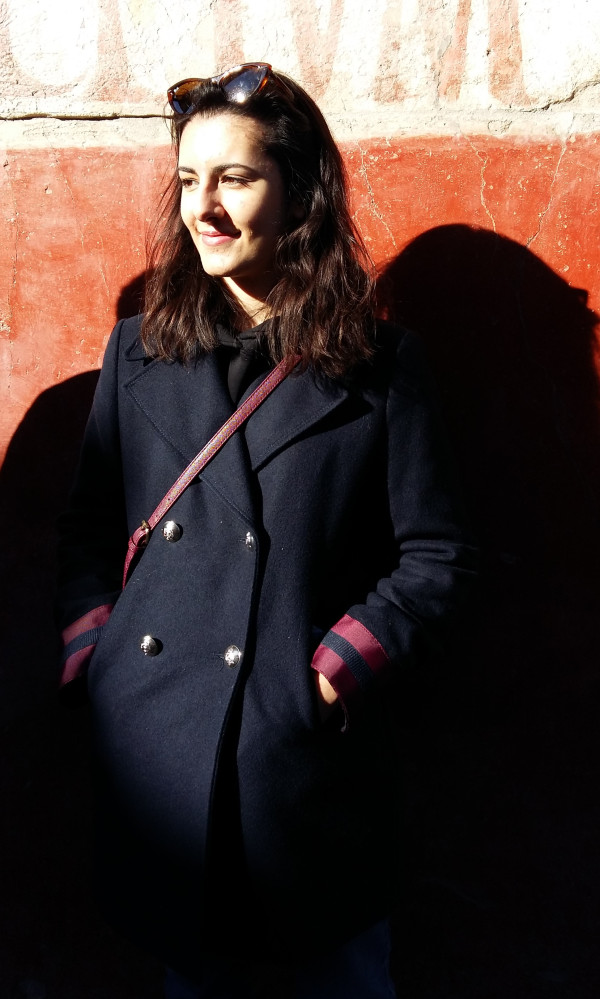Arianna Cantarella
Interviewed by Carey Sargent, EPFL, NCCR MARVEL, in February 2023
Have you always been interested in science?
My interest in science has always been clear to me since I grew up in a scientific family. My mother and my sister graduated in biology and my father is a veterinarian and is also interested in biology and science, and so it was pretty straightforward for me to be into it as well. I was thinking about it the other day—was there a moment in my life when I asked myself what I was interested in?—and no, there wasn’t such a moment because it was always obvious. I remember my parents asking me things about science and nature and what was happening around me when I was little. Things like “why do rain drops move up the window when the car is moving fast?” They tried to make me curious about nature.
How did you hear about the INSPIRE Potentials Program?
I heard about it because I was looking for a master’s thesis and I was sure I wanted to do it abroad. This is my first time living abroad and I’m 24 and I thought it was necessary to have an experience like this. I asked one of the professors who was most supportive and helpful during the master if he knew of any exchange program. He proposed to me to do several things, but, in the end, I had to decide between Erasmus in Germany, on experimental Physics, or something like this, here, which is computational. You can probably guess what I eventually chose. ;-)

What is the topic of your master’s project?
In general, the idea is to improve a database of 3D materials because some of the structures in it lack hydrogen atoms, even though we know that they should be there. This is because most of the structures are identified through XRD experiments, which are insensitive to light chemical species. We want to create an algorithm that can recognize where the hydrogens should be and restore them in those positions. Then we want to apply the algorithm to all those structures that have this problem.
How do you do that?
I study the structures where I know where the hydrogen atoms are—I need to study a test set. I take those structures, I remove the hydrogens and fix an initial negative charge in the cell, uniformly distributed, in order to simulate only the removal of positive ions of H. Then I study the electronic structure with DFT calculations and find what is called the electrostatic potential inside the structure. Then I try to look for the maxima of the electrostatic potential and I put the hydrogen atoms in those maxima spots, which often correspond to the original positions of the hydrogens. It’s more complicated than this, but that is the general idea. Currently, as already mentioned, we are trying to develop an algorithm to do all these steps subsequently. We need to fix more than 9,000 structures and so we need a fully automatic algorithm.
Do you think women face specific challenges in the sciences?
Yes, for sure. In the scientific fields I feel that many women lack self-confidence, probably due to the fact that the scientific environment is mainly made up of men. We, as women, are still trying to gain respect and trust from the scientific community, which men, historically, have never had to do because they could approach science much earlier. I am firmly convinced that it’s an heritage from the past thinking that men are better suited for scientific studies and many women are proving just the opposite nowadays. The challenge is to make understanding the scientific community that all the women are worthy in science.
Do you have any advice for young girls interested in the field?
I would first say: don't be scared. I have a lot of friends of mine, girls, that didn’t choose scientific careers because they were scared they couldn’t make it. This is not a positive thing. I’d also say that if they feel like they want to do something scientific and then they understand it’s not what they’re interested in, they can always change. But don’t focus on something else just because you’re scared of your future or perspectives. Also, try to ask for help in general, don’t try to do it all by yourself, because you’re not supposed to know everything. Asking questions is very important.
What are your plans for the future?
I’m graduating on the 20th of April and then I want to do a PhD. I’m still looking for a position. I want to continue with the scientific career.
Anything else?
I’d like to thank MARVEL and Nicola Marzari and Giovanni Pizzi in particular for this opportunity. Being in Nicola’s group is extremely special. We’re all working on the same kind of research, but the people are all so different. It’s a very unique environment.
